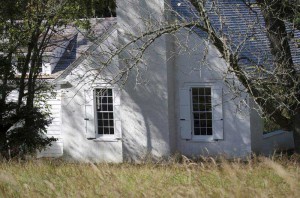
Andrew Wyeth’s Chadds Ford studio, where he painted for nearly a half century, was designation as a National Historic Landmark by the National Park Service, Monday.
CHADDS FORD — The studio of legendary local artist Andrew Wyeth was named as a National Historic Landmark by the National Park Service, Monday.
This designation for the studio follows that of the two other properties owned and made open to the public by the Brandywine River Museum of Art. The studio has been added to the Kuerner Farm’s National Historic Landmark designation, which was previously awarded in 2011; both sites are important in that they provided artistic inspiration for the artist and that they capture the historical integrity of his milieu. These properties, along with the similarly designated N.C. Wyeth House and Studio, awarded in 1997, are open daily for tours.
“We are honored to have the designation for this important American treasure. We know that the process is rigorous and painstaking and we are grateful to the National Park Service and all those involved, said Virginia Logan, executive director of the Brandywine Conservancy & Museum of Art.”
Andrew Wyeth (1917-2009) painted in the studio from 1940 until 2008. Thousands of works of art are associated with this studio, including those inspired by the farms and open space of the Brandywine Valley, and the Brandywine River that runs through Chadds Ford and the surrounding countryside, much of which has been permanently protected by the Brandywine Conservancy & Museum of Art. Built as a schoolhouse in 1875, the building also served as Wyeth’s home for two decades. He and his wife, Betsy, moved in shortly after their marriage in 1940, and lived there until 1961. The studio was given to the Brandywine Conservancy & Museum of Art by Betsy Wyeth in 2010.
“We are delighted that the Andrew Wyeth Studio has received the National Historic Landmarks designation,” said Thomas Padon, director of the Brandywine River Museum of Art. “The historic properties create a unique and layered experience for our visitors. Much of the Wyeth art they see in the museum was created in the historic studios of N.C. and Andrew Wyeth close to the museum’s property. Our audience can gain a richer understanding of these artists by seeing where they lived and worked and the land that inspired them.”







